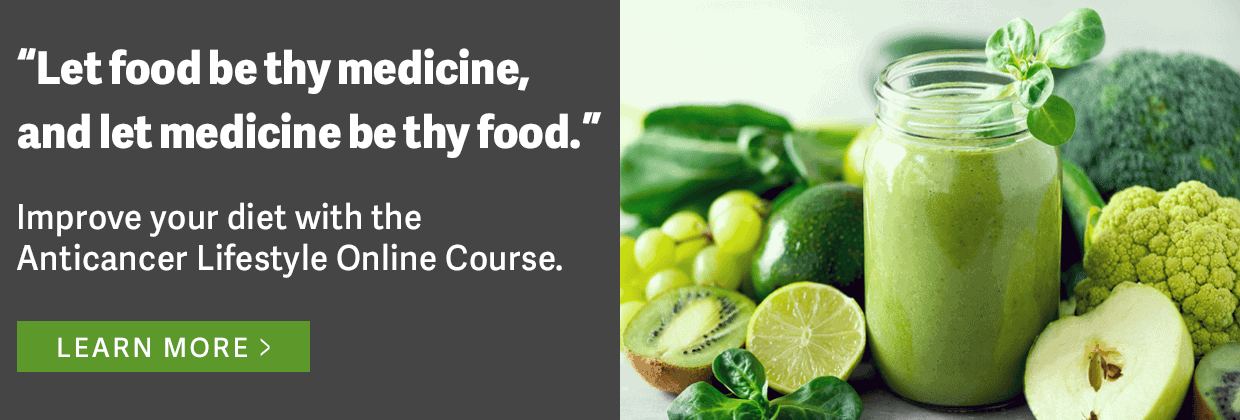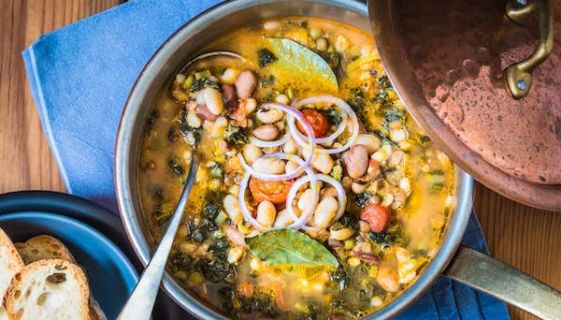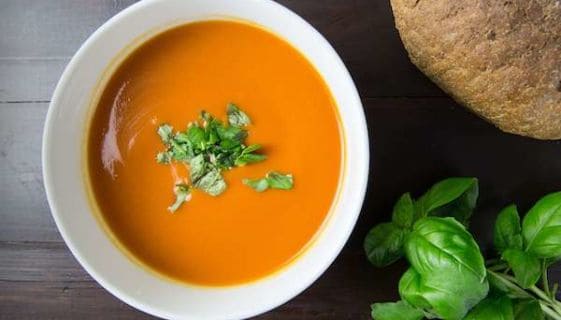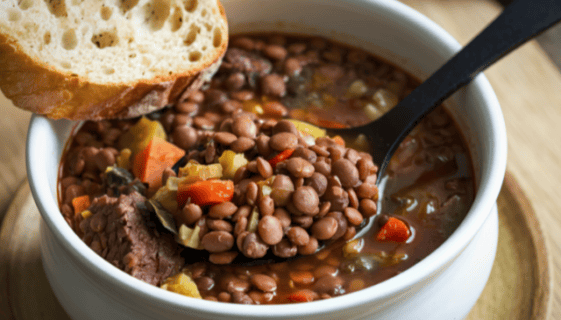Ingredients
Soup
- 2 Tbsp olive oil
- ½ onion, diced
- 1 carrot, diced
- 2 stocks of celery, diced
- 1-inch ginger, grated or 1 tsp ginger powder
- 2 garlic cloves, minced
- 2 sweet potatoes, cubed
- 1 Tbsp fresh rosemary, chopped
- 1 tsp turmeric
- 4 cups vegetable stock
- 1 cup dried red lentils
- 1 ½ cups coconut milk
- 3 cups fresh Kale
- Salt to taste
Herb Sauce
- 1 cup packed Italian parsley, fresh
- 1 cup packed cilantro, fresh
- 1 cup packed mint leaves, fresh
- 1 cup packed basil leaves, fresh
- 1 cup olive oil
- 4 Tbsp apple cider vinegar
- 4 Tbsp lemon juice
- 4 garlic cloves
- 1 tsp red pepper flakes (optional for spice)
- 1 tsp salt
- Black pepper to taste
Preparation
- Prepare the herb sauce by placing all ingredients in a blender or food processor and blend until smooth. Taste and adjust seasoning. This can also be prepared with a mortal and pestle, by combining all ingredients and smashing down the herbs and garlic to release the flavors.
- Mince the garlic and allow it to sit on the cutting board for at least 15 minutes to maximize the allicin production.
- Heat oil in a medium pot over medium heat. Add the onion, carrot and celery and cook for 5 minutes until soft. Stir the vegetables every couple of minutes to prevent sticking and over browning.
- Add the ginger, turmeric, rosemary, garlic and sweet potatoes. Cook for 2-3 minutes until fragrant.
- Add the broth and lentils. Season with ½ tsp of salt. Bring to a boil and then reduce heat to low. Cover and simmer for 20-25 minutes, until lentils and sweet potatoes are tender and soft.
- Stir in the coconut milk and kale and cook uncovered for 10 minutes.
- Remove from heat and allow soup to it for 10 minutes before serving. This will allow additional flavors to develop. Serve with a dollop of yogurt (dairy or non-dairy) and drizzle with herb sauce
Tips: The remaining herb sauce can be frozen in ice cube trays for up to 3 months and used in a variety of applications.
Here are some benefits from ingredients used in the recipe.
Kale: Low calorie, nutrient dense food. High in Vitamin K, rich in vitamin A, Vitamin C, excellent source of folate, non heme iron, magnesium, and calcium. Anti-inflammatory properties from phytonutrients that can help protect the body from cell damage. Promotes gut health due to it being a prebiotic (food for our good bacteria). Leafy greens have been shown to support brain functioning, lowering the risk of cognitive decline.
Garlic and Onions: Considered a pre-biotic, meaning it feeds the “good” bacteria in our gut and promotes a healthy digestive system. Research supports that the compounds such as allicin in garlic and onions have antioxidant, anti-inflammatory, antimicrobial, and cardioprotective properties.
Lentils: Good source of plant protein and folate. Areas around the world that have been identified to live the longest (Blue Zones) through research beans have been shown to be a common staple of consumption. Excellent source of dietary fiber that promote gut health (prebiotic), gut bacteria love beans.
Ginger: Heart healthy & blood sugar control – can lower cholesterol and blood sugar levels and improve various heart disease risk factors in patients with type 2 diabetes. Gut health – highly effective against motion sickness, nausea and even morning sickness in pregnant women; also helpful for digestive health and chronic indigestion. Anti-inflammatory – eases joint pain and stiffness. Antimicrobial – can lower risk of infections and boost immune system.
Coconut Milk: Great source of manganese. It can increase the good cholesterol levels (HDL). The fat in coconut is 90% MCTs which has shown to have a positive effect on metabolism and inflammation. Great non-dairy alternative for soups and sauces.
Turmeric: Curcumin in turmeric is poorly absorbed in the bloodstream, so it should be combined with black pepper, as it contains the substance pipeline which enhances the absorption of curcumin by 2,000%. It is a very powerful anti-inflammatory compound at the molecular level – blocks the molecule NF-kB that turns on inflammatory genes in our cells. Increases antioxidant capacity of our bodies by neutralizing free radicals on its own and also stimulates our body’s own antioxidant enzymes. It has been shown to improve endothelial function
Olive Oil: Rich source of monounsaturated fats. Contains antioxidants that exhibit anti-inflammatory effects.
Sweet Potato: High in fiber (7 grams per cup), vitamin A, C, and potassium. The high vitamin A content promotes eye health and boosts the immune system.
Parsley, Cilantro, Mint, Basil: All come from flowering plants and contains nutrients such as Vitamins A, C, and K, and packed full of antioxidants that help to prevent cancer. Such antioxidants are lutein, beta carotene, and zeaxanthin which not only are known to reduce the risk of cancer, but also can prevent age-related macular degeneration and support liver health.


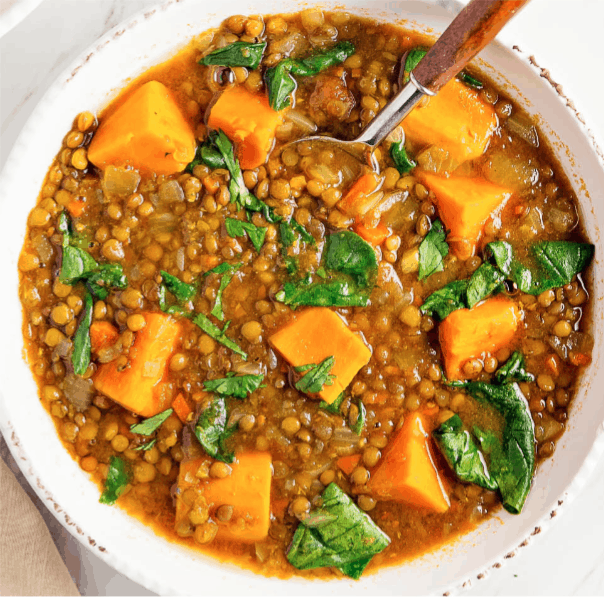
 Ananda Kaplan
Ananda Kaplan
